Implementing an Interactive Voice Response (IVR) system is a game-changer for businesses aiming to enhance customer service efficiency. With 72% of customers expecting immediate responses when contacting support, IVR systems meet this demand by automating call routing and providing 24/7 self-service options.
Moreover, businesses that utilize IVR report a 15% increase in customer satisfaction (Gartner), highlighting its impact on customer experience and operational productivity. Discover how IVR can enhance your customer experience and operational efficiency by reading our in-depth guide on IVR system costs, features, and top IVR provider.
Continuously refine and improve your IVR system by incorporating customer feedback and analyzing performance data.
This ensures a seamless experience, reduces caller frustration, and enhances overall efficiency.
IVR Pricing Breakdown
Grasping IVR pricing is essential for businesses planning to adopt this technology. The average costs vary based on call volume, duration, and routing complexity, typically between $15 and $150. The cost structure typically includes:
1. Setup Fees
Setup fees for ivr solutions cover the initial costs of configuring and deploying an IVR system, including installation, customization, and integration with existing systems. These one-time charges are essential for establishing the system’s functionality and ensuring it meets specific business requirements.
2. Monthly Subscription Fees
Monthly subscription fees are recurring charges for using the IVR system, typically based on usage, features, or the number of users. These fees contribute to the overall ivr system cost, providing ongoing access to the system’s functionalities, updates, and support.
3. Call Charges
Call charges apply to each call made or received through the IVR system, often billed per minute. These charges impact the ivr system cost, with expenses varying based on call volume and duration. Managing call charges effectively helps control the overall operational costs associated with the IVR system.
4. Maintenance Fees
Maintenance fees cover ongoing updates, technical support, and system troubleshooting for the IVR system. These fees are a key component of the ivr cost, ensuring the system remains functional and up-to-date. Regular maintenance helps prevent disruptions and extends the system’s longevity.
Factors Influencing IVR System Cost
The cost of an IVR system can vary significantly based on several factors:
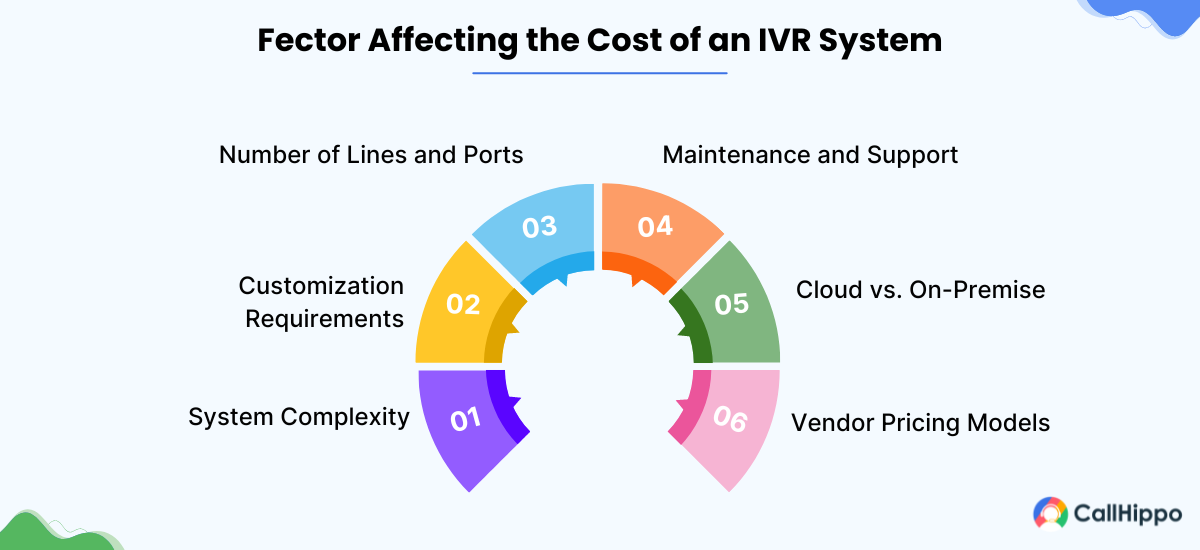
1. System Complexity
The complexity of an IVR system, including the number of features and the sophistication of call flows, directly impacts the ivr system cost. More intricate systems with advanced functionalities like speech recognition, voice recognition and multi-level menus require greater investment. Nevertheless, these features can greatly improve customer service and operational efficiency, making the higher cost justifiable.
2. Customization Requirements
Tailoring an IVR system to meet specific business needs, such as integrating with existing CRM or ERP systems, can increase the ivr system cost. Customization ensures the IVR aligns with your unique workflows and branding, enhancing overall efficiency and customer satisfaction. However, the added functionality and personalized experience often justify the additional expense.
3. Number of Lines and Ports
The capacity of an IVR system to handle multiple simultaneous calls is determined by the number of lines and ports it supports. A higher number of lines and ports allows for greater call volume management but also increases the ivr system cost. Businesses must balance their call handling needs with the associated costs to optimize efficiency and customer service.
4. Maintenance and Support
Regular maintenance and support are essential for maintaining an IVR system’s optimal performance. This encompasses software updates, technical support, and troubleshooting. These services add to the ivr system cost but are essential for minimizing downtime and ensuring a smooth customer experience. Investing in thorough maintenance and support helps avoid expensive disruptions and prolongs the lifespan of the system.
5. Cloud vs. On-Premise
The choice between cloud-based and on-premise IVR systems affects the ivr system cost significantly. Cloud solutions generally have lower initial costs and offer flexible subscription plans, though they may lead to recurring monthly fees. On the other hand, on-premise systems require a significant upfront investment in hardware and software but provide greater control and potentially lower long-term costs.
6. Vendor Pricing Models
IVR system costs can vary based on the vendor’s pricing model, which may include per-minute billing, per-user fees, or flat-rate charges. Some vendors offer tiered pricing based on features and usage levels. Understanding these models helps businesses select a plan that aligns with their needs and budget, ensuring cost-effectiveness and flexibility.
IVR Phone System Features
Interactive Voice Response (IVR) systems have transformed customer service by offering a smooth and efficient connection between callers and businesses. The key features of an IVR system include:
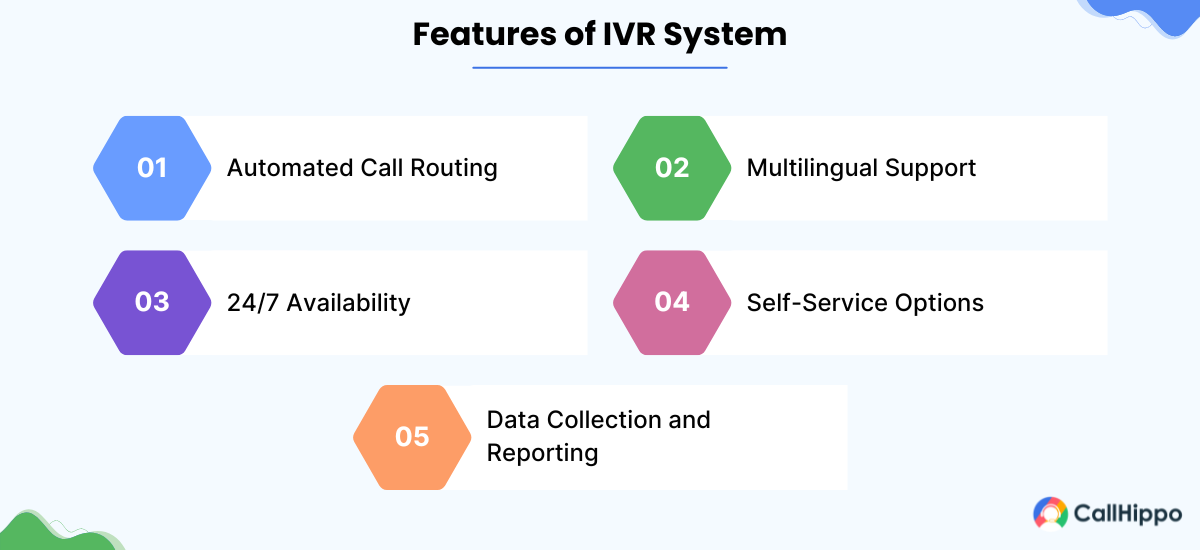
1. Automated Call Routing
IVR systems enhance customer service by automatically routing calls to the right departments or agents according to caller inputs. This efficiency reduces wait times and boosts overall customer satisfaction. By minimizing the need for manual call handling, businesses can significantly lower operational expenses, contributing to a more efficient service model and reducing overall interactive voice response system cost.
2. Multilingual Support
IVR systems with multilingual support cater to a diverse customer base by allowing callers to select their preferred language for interaction using natural language processing. This feature improves accessibility and customer satisfaction, making it essential for businesses with a global reach. While implementing multilingual support can affect IVR pricing, the benefits of improved customer experience and broader reach justify the investment.
3. 24/7 Availability
IVR systems run 24/7, allowing customers to access information and services whenever they need. This continuous availability enhances customer satisfaction by providing immediate responses to inquiries and support needs, even outside of regular business hours. Businesses benefit from improved service reliability and increased customer engagement.
4. Self-Service Options
IVR systems enable customers to perform tasks like checking account balances, making payments, or booking appointments without human intervention. This capability boosts customer convenience and alleviates staff workload, driving greater operational efficiency. Implementing self-service options can optimize the ivr system cost by lowering the need for extensive human resources.
5. Data Collection and Reporting
IVR systems collect valuable data from customer interactions, such as call patterns, preferences, and frequently asked questions.This data is compiled into comprehensive reports, offering insights that help businesses enhance their services and improve customer experiences. Utilizing this data effectively can lead to better decision-making and operational efficiency, justifying the ivr system cost with its long-term benefits.
Top 5 IVR Service Providers
Explore leading IVR service providers that offer robust, scalable solutions to enhance customer service. These providers are renowned for their features, reliability, and competitive pricing, making them top choices for businesses seeking effective IVR systems.
1. CallHippo
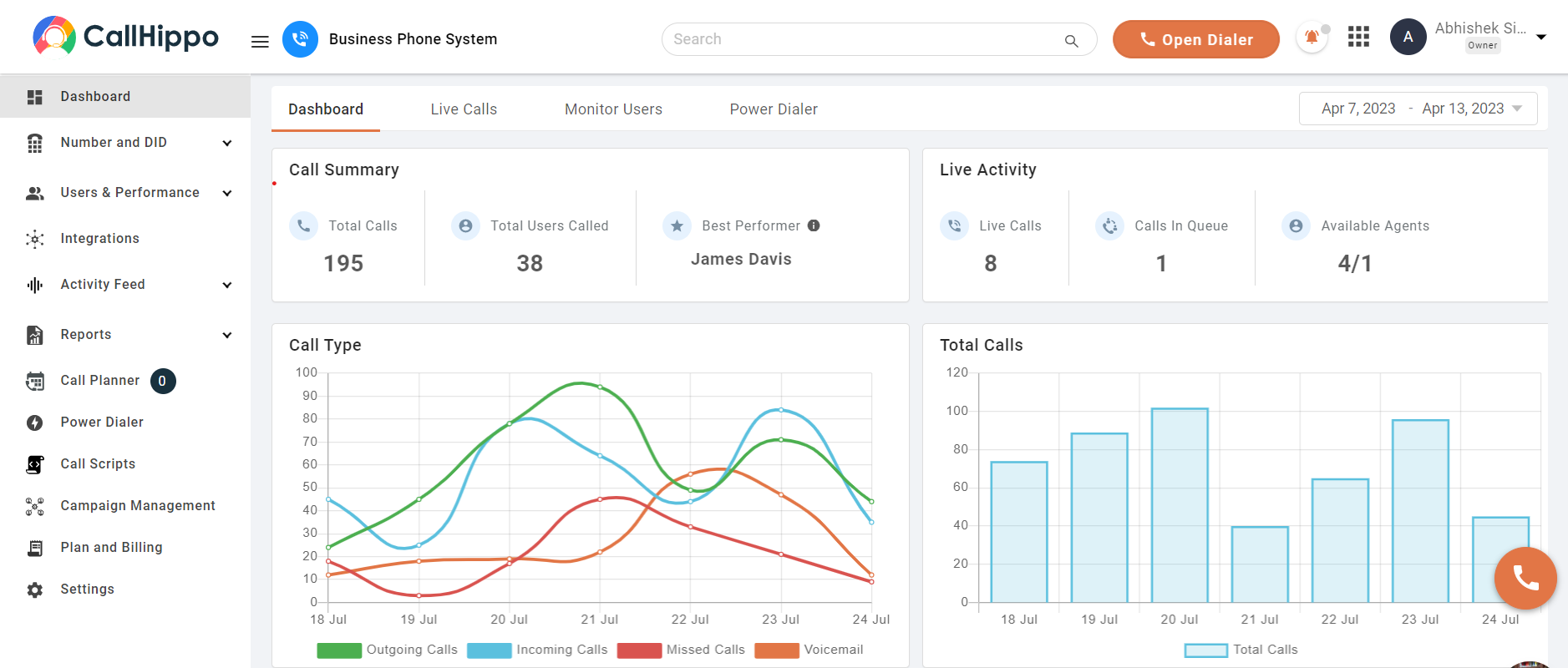
CallHippo offers a user-friendly IVR system with features such as intelligent call routing, multi-level menus, and real-time analytics which are must have for a call center or a business. It is an excellent choice for businesses of all sizes, providing cost-effective solutions with flexible pricing plans.
Key features
- Intelligent call routing
- Multi-level menus
- Real-time analytics
- CRM integration
- Voicemail and call recording
Pros
- Provides comprehensive call analytics for better decision-making.
- Easy integration with major CRM systems enhances workflow efficiency.
- User-friendly interface simplifies setup and management.
Cons
- Limited advanced features compared to some competitors.
- Occasional connectivity issues reported by users.
Pricing
- Starter – $18 per user per month
- Professional – $30 per user per month
- Ultimate – $42 per user per month
*Pricing as of 29-07-2024.
2. Avoxi
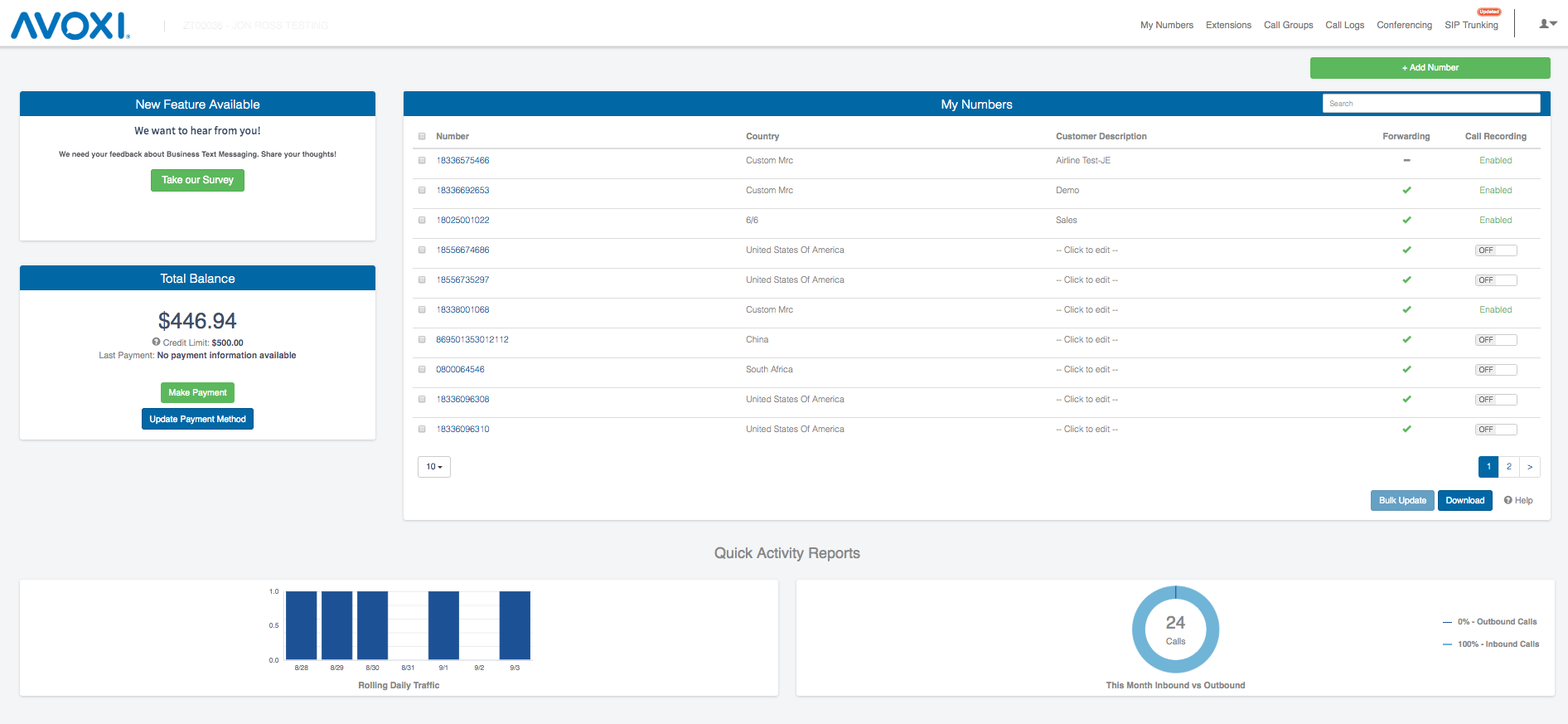
Avoxi provides a robust IVR system with advanced features like call queuing, voice recognition, and global phone numbers. Its scalable solutions are ideal for growing businesses, offering competitive pricing and exceptional customer support.
Key Features
- Call queuing and voice recognition
- Global phone numbers
- Multi-level IVR menus
- Call recording and analytics
- Integration with CRM systems
Pros
- Offers robust global calling capabilities with local numbers.
- Advanced call management features improve customer handling.
- Reliable voice recognition technology enhances user experience.
Cons
- Setup can be complex for first-time users.
- Higher pricing tier for advanced features.
Pricing
- Standard – 2.5% of spend with $9.99 per month minimum
- Premium – 4% of spend with $99.99 per month minimum
3. Cloudtalk
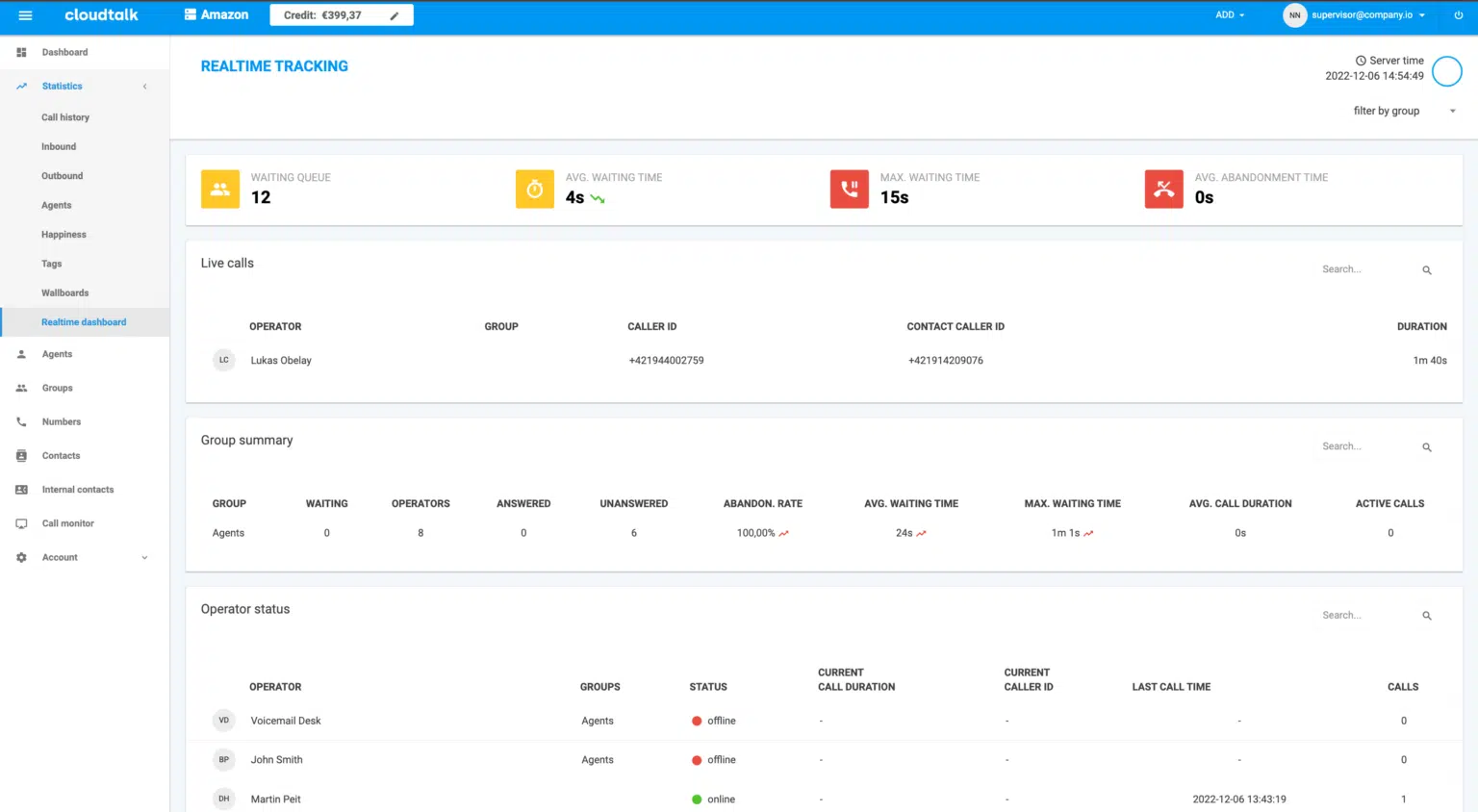
Cloudtalk’s IVR system is known for its ease of use and seamless integration with popular CRM tools. It offers customizable call flows, multilingual support, and detailed reporting, making it a versatile choice for various industries.
Key Features
- Customizable call flows
- Seamless CRM integration
- Real-time reporting and analytics
- Voicemail transcriptions
- Call recording and tagging
Pros
- Integration with popular CRM tools streamlines operations.
- Real-time analytics provide valuable insights for optimization.
- User-friendly interface and easy setup.
Cons
- Limited features in the basic pricing tier.
- Occasional issues with call quality.
Pricing
- Starter – $25 per user per month
- Essential – $30 per user per month
- Expert – $50 per user per month
- Custom – Contact sales for pricing
4. Aircall
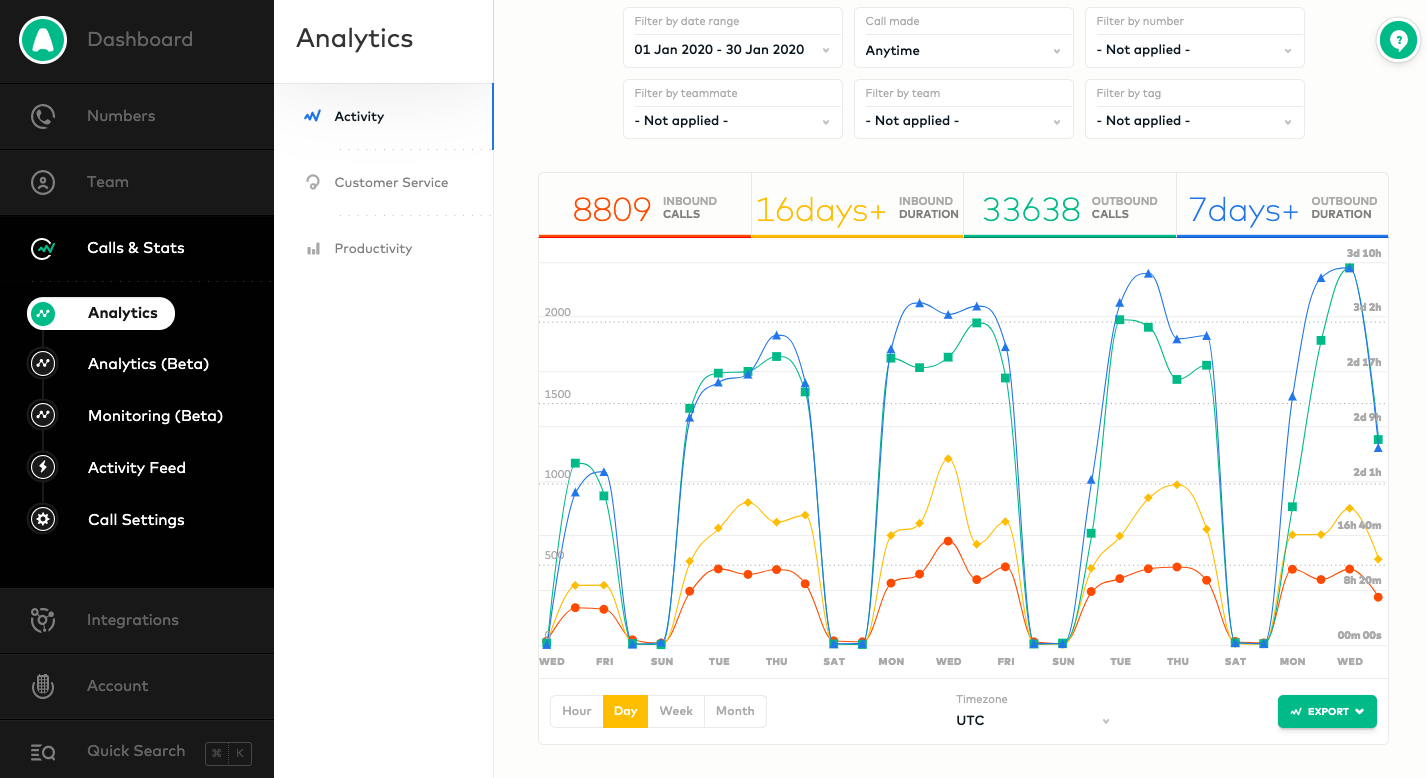
Aircall delivers a comprehensive IVR solution with features such as drag-and-drop call flow designer, real-time call monitoring, and CRM integration which are important for call centers. Its transparent pricing and reliable performance make it a favorite among businesses.
Key Features
- Drag-and-drop call flow designer
- Real-time call monitoring
- CRM and helpdesk integration
- Voicemail, call recording, and tagging
- Advanced analytics and reporting
Pros
- The drag-and-drop designer makes call flow customization simple.
- Seamless integration with CRM and helpdesk systems.
- Real-time monitoring allows for immediate call management.
Cons
- Higher pricing compared to some other providers.
- Some users report occasional glitches in the interface.
Pricing
- Essential – $30 per license
- Professional – $50 per license
- Custome – Contact sales for pricing
5. Justcall
Justcall’s IVR system stands out for its simplicity and effectiveness. It includes features like call forwarding, automated responses, and integration with business tools, offering affordable pricing plans suitable for small and medium-sized enterprises.
Key Features
- Call forwarding
- Automated responses
- Integration with business tools
- Voicemail and call recording
- Multi-level IVR menus
- Real-time call analytics
Pros
- Simple setup and easy-to-use interface.
- Affordable pricing plans for small and medium-sized businesses.
- Comprehensive integration with various business tools.
Cons
- Limited advanced features compared to higher-end solutions.
- Customer support response times can be slow.
Pricing
- Essential – $19 per user per month
- Team – $29 per user per month
- Pro – $49 per user per month
- Business – Contact sales for pricing
Conclusion
Implementing an IVR system can significantly enhance customer service and operational efficiency. Understanding the factors that influence IVR system costs and the pricing structures of different providers is essential for making an informed decision. With a range of options available, businesses of all sizes can find a suitable IVR solution that meets their needs and budget.
Whether you’re considering CallHippo, Avoxi, Cloudtalk, Aircall, or Justcall, evaluating the features, costs, and support offered by each IVR service provider will help you choose the best IVR system for your business.
FAQs
1. What is an IVR system?
An Interactive Voice Response (IVR) system is a telephony technology that allows callers to interact with a company’s phone system through voice or keypad inputs. It automates ivr call flow, call handling, call recording, providing information or routing calls based on the caller’s choices.
2. How does an IVR system work?
An IVR software works by presenting callers with a series of prerecorded messages and options. Callers respond using their voice or keypad, and the system processes these inputs to provide information, execute tasks, or route calls to the appropriate department or agent.
3. Can small businesses afford an IVR system?
Yes, small businesses can afford an IVR system. Many IVR providers offer scalable solutions with flexible pricing plans tailored to the needs and budgets of small enterprises. Cloud-based IVR systems, in particular, offer lower upfront costs and affordable monthly subscriptions.

Subscribe to our newsletter & never miss our latest news and promotions.









